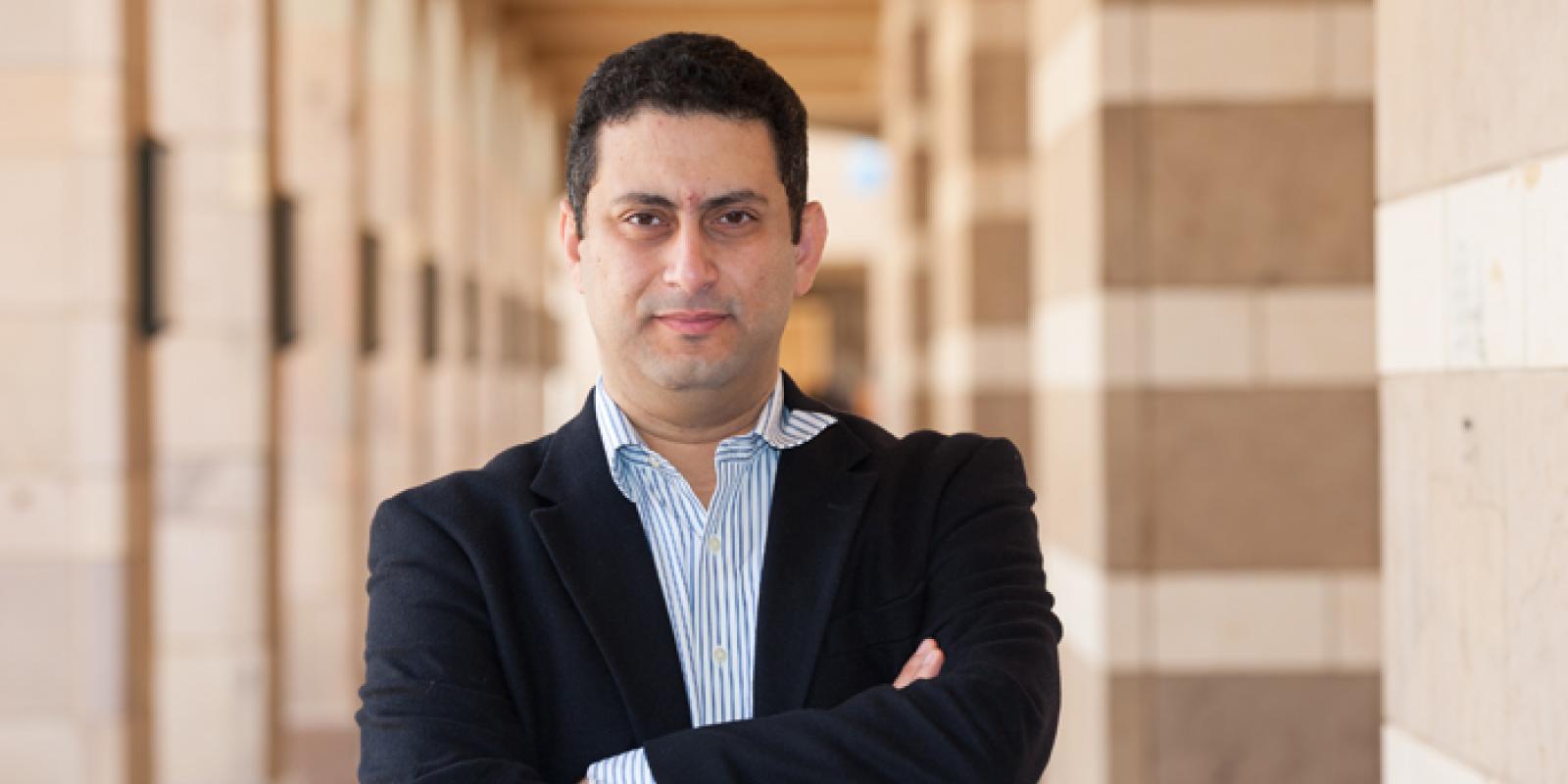
Ayman Ismail: Experiential Learning Key to Entrepreneurship
With the success of startups like Facebook and Netflix, the latest buzzword in the business community has been “entrepreneurship,” or the capacity to develop a business venture through innovation and risk taking. As more and more individuals aspire to become the next Steve Jobs or Mark Zuckerburg, there is a growing debate in academic circles about whether or not entrepreneurship can be taught. Is entrepreneurship something innate or can it be cultivated in the classroom?
According to Ayman Ismail, assistant professor and Abdul Latif Jameel Endowed Chair of Entrepreneurship at AUC’s School of Business, entrepreneurship entails a combination of both innate talent and cultivated skills. “Entrepreneurship is like acting or singing,” he said. “You need to have some sort of talent, but then you need to study ways to refine your voice and skills. There is a part about personal and behavioral capacity, but there is also a part about studying the mechanics of how to start and run a business.”
In the classroom, Ismail teaches his students the mechanics of establishing a business, in addition to making them more self-conscious of the behaviors that are necessary for true entrepreneurship. “I can teach you to how write a business plan, how to create a budget or how to pitch an idea. However, when it comes to behavior, I can tell you that entrepreneurs are persistent, but I can’t teach you persistence. I can tell you that entrepreneurs are creative, but I can’t teach you creativity,” he explained. “What I can do is inspire you by telling you stories about successful entrepreneurs and I can support you as you explore and develop these behaviors through learning-by-doing.”
To cultivate the skills and behaviors of entrepreneurs, Ismail takes a unique approach in his teaching methods. “There are different ways of teaching,” Ismail said. “There is the traditional way, which includes simply writing things on the board, lecturing and sometimes discussing. But if I am trying to develop entrepreneurial behavior, students have to do things themselves. This is called ‘experiential learning,’ where you’re learning-by-doing. You are working with your team, talking to different people, experimenting, adapting, getting different perspectives and internalizing them.”
This teaching approach is much needed in Egypt, where most of the schools adopt a traditional teaching approach, according to Ismail. “In many Egyptian schools, there is more teaching than learning, where education is mostly based on memorization rather than critical thinking,” he said. “Our schools need to give students the opportunity to experiment, succeed and fail; and to learn from these experiences to develop their own voice and character.”
Ismail chooses to challenge the traditional education system by providing students with an experiential learning classroom environment. “I rarely put up slideshows,” he affirmed. “Instead, I have my students work in teams, develop business plans, interview people and create their own business models. It’s pretty much real-life work because it is so hands-on, and I think the skills they get are very transferable to any job, whether it’s a corporate position or starting their own business.”
For Ismail, the best expression of an experiential learning environment that cultivates entrepreneurship is the AUC Venture Lab, a startup incubator that helps Egypt-based startups become commercially viable ventures. The lab, located in a brightly lit working space in the AUC School of Business, provides resources, workshops and business mentors to aspiring talent with unique business ideas.
“The word ‘lab’ is a very scientific term, and this was used purposefully,” Ismail noted. “In this lab, we are doing something like conducting a science experiment, where you mix different ingredients, not knowing exactly what the result will be, but then something sparks in the end.”
According to Ismail, this lab is experiential learning in its purest form because it is offers a variety of opportunities for “learning-by-doing.” For the entrepreneurs, the AUC Venture Lab provides them with the space to interact with their peers, listen to mentors and access AUC’s numerous facilities. For AUC students, the lab offers them the opportunity to learn about what it means to be an entrepreneur on a firsthand basis. Students may sign up for different courses that allow them to sit in on mentorship sessions and pitches at the lab. Moreover, MBA students are working with these startups to help create their business plans, and mass communication students are helping entrepreneurs develop their pitches.
“For the students, they are learning about entrepreneurship from the entrepreneurs themselves. For the entrepreneurs, they have access to amazing resources and are surrounded by an intellectual environment. Being on campus helps you learn by osmosis,” Ismail explained. “This is experiential learning for the entrepreneurs, students and even faculty members. It is a very rich learning environment.”
These incubators are clearly important in a country like Egypt where it is often difficult to establish and develop a business. According to the World Economic Forum’s Global Competitiveness Report, Egypt has a market efficiency score of 4.1 on a scale of 1 to 7. “The business environment in Egypt has always been tough, whether you’re a small startup or corporation — getting customers, getting talent,” said Ismail. “It’s a tough market to do business.”
But Ismail is optimistic about business in the region, especially with the amount of young talent in Egypt. “This generation is willing to take risks and establish its own businesses, but it is important to create an ecosystem that promotes entrepreneurial behavior and supports startups,” he noted. “A lot of youth are getting more interested in trying their own ventures, and that’s a positive and encouraging step.”
